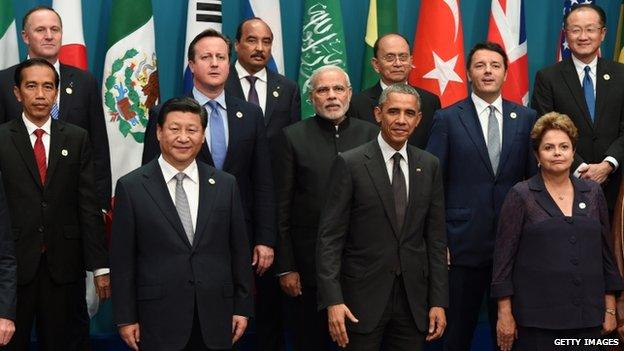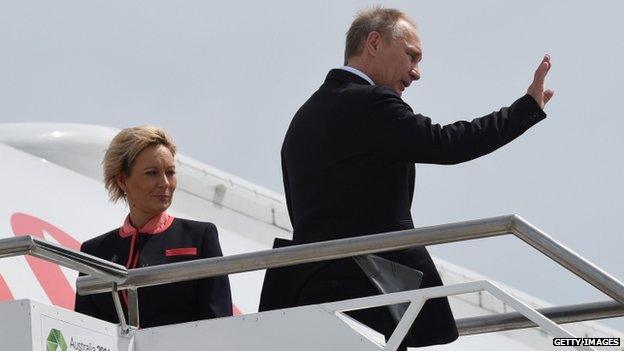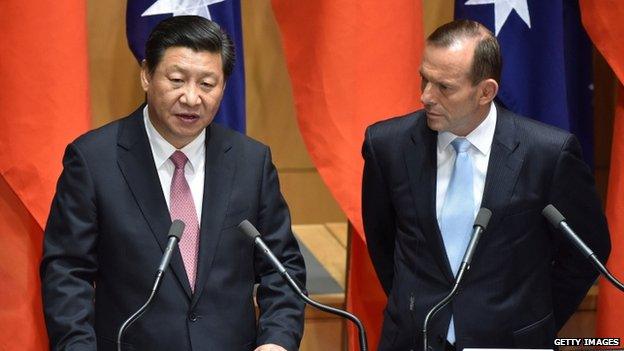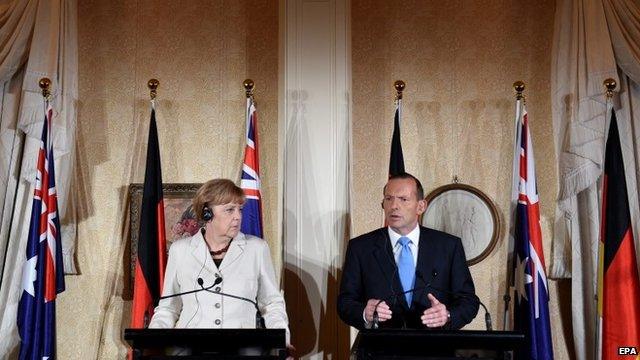World media pick over G20 summit
- Published

The G20 leaders have pledged to boost global growth
As commentators across the world begin to assess the outcome of G20, which closed in Brisbane on Sunday, some note that the event was overshadowed by criticism of Russia over its role in Ukraine.
Others are pleased that climate change and the Ebola crisis made it into the leaders' final statement, which was more than some expected.
One Indian daily says world leaders must not allow political disputes to undermine their efforts to overcome the global economic crisis.
Putin defended
In Russia, state media and pro-Kremlin commentators appear to be downplaying what some observers see as the cool reception given to President Vladimir Putin by other world leaders.
Most TV channels this morning are focusing on Mr Putin's interview with Germany's ARD, external channel and a gas explosion in Moscow, seemingly steering clear of suggestions that Mr Putin left Brisbane earlier than planned, reportedly to avoid further snubs.
The English-language RT, external, however, did say that "Putin may have had a lukewarm reception" but added that "he certainly stuck to his guns".
On Sunday, TV channels briefly reported on Mr Putin's early departure and quoted his own explanation that he needed sleep.
The RBK, external liberal daily quotes international relations expert Andrey Sushentso saying Mr Putin gave a "reasonable" explanation for his early departure and the Western media's reaction is "of secondary importance".

Russia's President Vladimir Putin left abruptly before the summit ended
But in the same paper, Alexei Makarkin is quoted as warning that Russia is being "increasingly isolated", adding that "BRICS nations won't quarrel publicly with the US for Russia's sake".
The isolation theme is picked up in Germany where a commentator in the widely-read Bild, external newspaper, warns that Russia must not be left in the cold.
"Putin has written off the West. And in the main the West has written Putin off," Bela Anda writes.
"So [German Chancellor] Angela Merkel did well to negotiate with Putin for four hours during the night. We cannot afford to give up on Russia. The price would be too high."
'Humane living conditions'
Elsewhere, papers in Turkey, which is due to take over the rotating presidency of G20 this December, and China debate if the body can deliver on big issues, such as climate change or curbing the spread of Ebola.
"It is important that [Sunday's] final communique stated the need for a more comprehensive discussion at the G20 summit on the fight against the spread of the Ebola virus, and - upon Prime Minister Davutoglu's insistence - the need to focus on the plight of refugees, and its recommendation that international institutions should do more to provide aid," writes Istanbul-based Yeni Safak, external.
With G20 countries making up two-thirds of the global population, the body should be "the most vociferous defender of the people's right to live in humane living conditions."

China and Australia have signed a landmark trade deal
Chinese papers see Beijing's nomination to host the G20 summit in 2016 as a sign of the country's growing influence in international affairs. They focus on President Xi Jinping's call for a more efficient and inclusive global financial system.
The widely-read China Daily, external praises Beijing's own achievements in carrying out economic reforms, but another influential paper, The Global Times, external, points out that the international community must do much more to solve the global economic crisis.
In India, the Amar Ujala, external daily is pessimistic about future summits.
Whilst acknowledging that the Brisbane meeting pledged to tackle some important issues it appeals to leaders not to allow political disputes to dominate.
"Economic reforms must be above politics," it said. "But it's really very concerning the way regional and global organisations, which were formed with an aim to boost mutual cooperation, are continuously becoming platforms for political disputes."
BBC Monitoring, external reports and analyses news from TV, radio, web and print media around the world. You can follow BBC Monitoring on Twitter, external and Facebook, external.
- Published16 November 2014
- Published16 November 2014

- Published16 November 2014